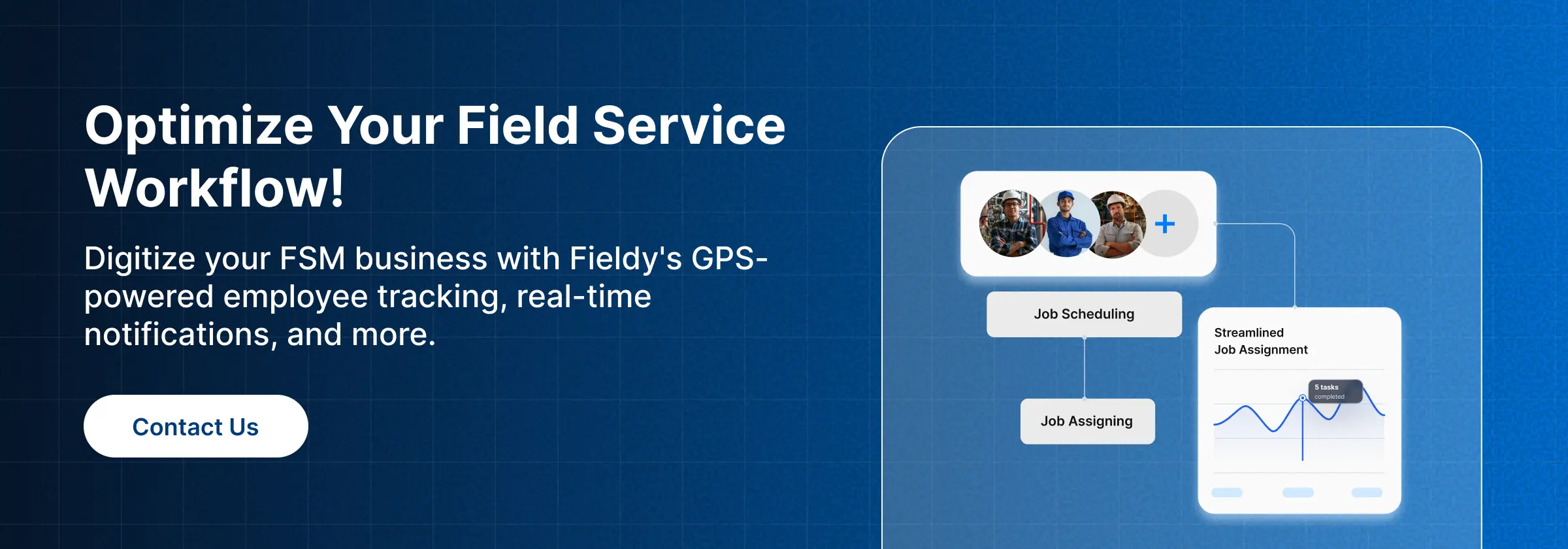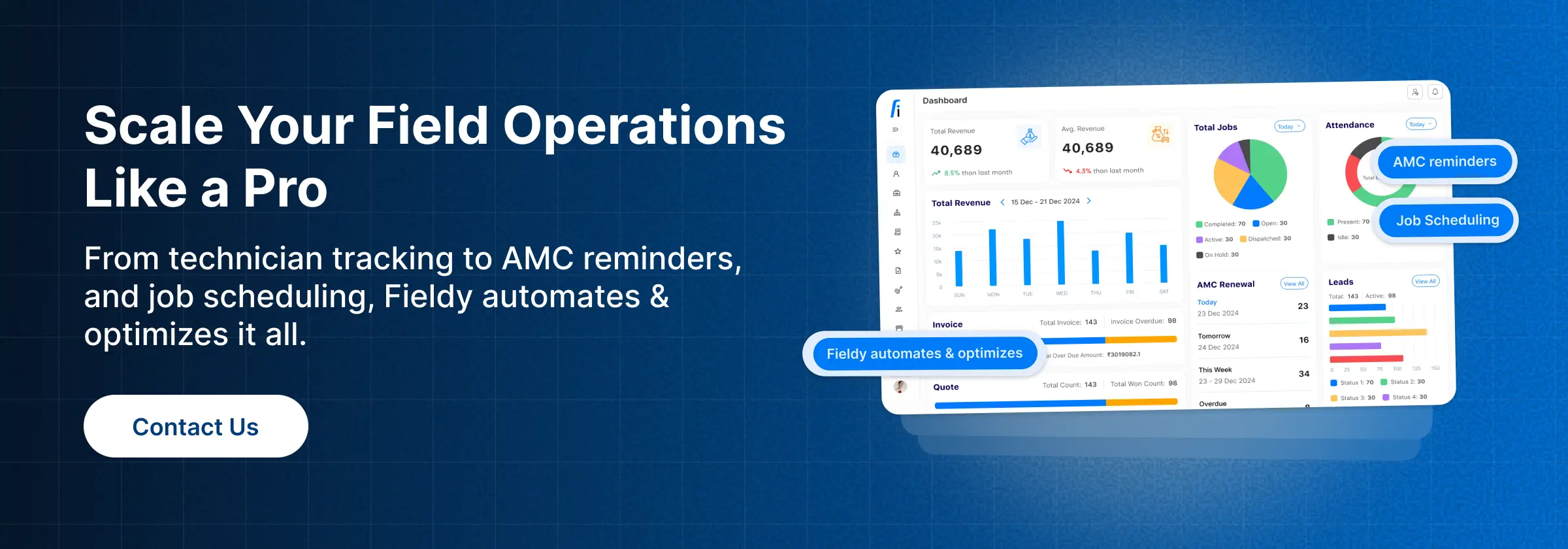🔑 Introduction
Why the Best HVAC Software Matters in 2026
Usually, it is this bit of operation management aspect that separates the good years from the struggling ones in the HVAC business. With labor shortages, rising energy regulations, and picky customers, using a spreadsheet or a few apps here and there is now just a recipe for meltdown.
In fact, 70% of field service businesses said their growth is actually limited by an outdated system (Field Service News, 2024). The best HVAC software in 2026 does not just deal with scheduling; it in fact generates revenue, leads, customer experience, and technician efficiency.
Podium has forever been an HVAC-company favorite for managing reviews and customer communication. But come 2026, the leaders in HVAC are posing the question: Is Podium really enough to manage the entire service lifecycle? The answer is increasingly turning out to be “No.” Companies are going to need a truly integrated, all-in-one platform that connects, very tightly, field operations with customer engagement and contract management.
That’s where Fieldy comes in. Positioned as the most complete choice for modern contractors, Fieldy combines CRM, dispatch, invoicing, AMC contract automation, field analytics, and GPS tracking, all in one app. For small teams especially, the best HVAC software for small business ensures affordability without compromising on features.
🧭 What to Look for in the Best HVAC Software in 2026
Choosing the best HVAC software in 2026 isn’t about grabbing the shiniest app or the one with the slickest dashboard, it’s about investing in tools that actually solve field problems, cut costs, and improve customer satisfaction. HVAC businesses run on thin margins and tight schedules, so the right platform needs to support both technicians in the field and managers in the office.
Here’s a closer look at the non-negotiables every HVAC business should demand:
📱 Mobile-First Design with Offline Access
- Why it matters: Technicians often work in basements, attics, or rural job sites with weak connectivity.
- What it solves: Prevents downtime, jobs, notes, and customer signatures aren’t lost when offline.
- Example: With Fieldy, techs can log work orders, take photos, and create invoices offline, then sync automatically once back online.
🗺️ Smart Dispatch & GPS-Based Routing
- Why it matters: HVAC fleets spend 20–25% of operating budgets on fuel. Inefficient routing wastes money and time.
- What it solves: Assigns the nearest available technician, optimizes fuel usage, and reduces customer wait times.
- Example: Fieldy’s live GPS tracking gives dispatchers real-time visibility, ensuring accurate ETAs and fewer missed jobs.
💳 Integrated CRM, Quoting, Invoicing, and Payments
- Why it matters: Switching between apps for customer info, quotes, and invoices increases errors.
- What it solves: Provides a single source of truth from lead capture to payment, reducing billing delays and disputes.
- Example: With Fieldy, contractors can create a quote, convert it to a job, and invoice, all in one system.
📆 AMC/Maintenance Contract Automation
- Why it matters: Recurring contracts are the backbone of HVAC profitability, yet 40% of businesses still track them manually.
- What it solves: Automates reminders, schedules recurring jobs, and ensures no renewals are missed.
- Example: Fieldy’s AMC module renews contracts automatically, preventing lost revenue from forgotten maintenance visits.
💬 Customer Communication & Online Reputation Tools
- Why it matters: Customers check Google reviews before calling. Reputation can make or break leads.
- What it solves: Automates review requests, appointment reminders, and AI chat responses, all integrated into field service operations.
- Example: Tools like Podium excel in communication, but Fieldy combines those features with dispatch, AMC, and invoicing for a full-stack solution.
🛠️ Inventory, Assets, and Parts Workflows
- Why it matters: A missing part can delay a job, frustrate customers, and hurt profitability.
- What it solves: Tracks inventory in real time, automates reorders, and helps technicians confirm availability before leaving.
- Example: Fieldy’s inventory tracking prevents wasted trips by letting technicians check stock from their mobile device.
⚡ Fast Setup and Transparent Pricing
- Why it matters: Small-to-mid HVAC businesses can’t afford lengthy implementations or hidden fees.
- What it solves: Predictable pricing and easy onboarding mean faster ROI.
- Example: Fieldy’s flat $25/user/month avoids surprise costs while delivering enterprise-grade features.
🏢 Central Dashboard for Multi-Location or Franchised Teams
- Why it matters: Growing HVAC businesses need visibility across multiple branches.
- What it solves: Provides one dashboard to track KPIs, technician efficiency, contracts, and revenue across all locations.
- Example: Fieldy’s franchise-ready dashboards make it easier for owners to manage consistency and growth at scale.
The best HVAC software in 2026 must cover all these areas, not just scheduling or communication. By choosing platforms like Fieldy, HVAC businesses can reduce wasted costs, strengthen customer retention, and scale operations with confidence.
🏆 Top 5 HVAC Software for 2026 (Why Fieldy Is #1)
1. Fieldy 🥇
If there’s one name that HVAC businesses in 2026 can’t afford to overlook, it’s Fieldy. Unlike tools that specialize in just one area, Fieldy is purpose-built to give contractors everything in one place: CRM, dispatch, AMC contract automation, invoicing, billing, and real-time GPS tracking. It’s not just a scheduling app, it’s a complete HVAC Field Service Management Software solution designed to optimize both office and field operations.
Use cases include:
- Residential HVAC teams manage dozens of recurring maintenance contracts without missing renewals.
- Franchise chains coordinating AMC schedules and technician routes across multiple branches.
- Service firms working in rural or low-connectivity areas using Fieldy’s offline access to keep jobs moving.
What makes Fieldy stand out is how it connects day-to-day operations with long-term growth. By aligning technician performance, customer communication, and financial workflows, it ensures HVAC businesses don’t just handle jobs efficiently but also nurture customers throughout their lifecycle. This makes Fieldy more than an FSM tool, it complements contract lifecycle management software principles by helping companies build loyalty and repeat revenue at scale.
2. Podium 🥈
Podium’s reputation is built on AI-powered customer communication, from text-based outreach to automated review requests. It centralizes customer conversations, which makes it popular among HVAC businesses prioritizing online reputation.
Use case: HVAC businesses focused on boosting Google reviews, responding quickly to customer texts, and increasing booking conversion rates.
Fieldy’s edge: While Podium shines in communication, Fieldy goes further, combining Podium-style customer engagement with operational modules like dispatch, AMC tracking, and invoicing.
3. Housecall Pro 🥉
Housecall Pro has earned its place as a user-friendly, mobile-first tool for small HVAC companies. It covers scheduling, dispatch, invoicing, and customer interaction in an intuitive way.
Use case: Single-route service providers or small businesses that need a quick-to-deploy solution without complex setup.
Fieldy’s edge: Beyond usability, Fieldy adds real-time tracking, contract automation, and inventory control, features critical as businesses scale. For quick details, check Fieldy vs Housecall Pro’s comparison.
4. Service Fusion / ServiceTitan 💼
Both Service Fusion and ServiceTitan have been staples in HVAC software comparisons for years. They offer job documentation, scheduling, and accounts receivable (A/R) management, making them strong for financial oversight.
Use case: Mid-sized HVAC companies with heavy focus on job tracking and financial workflows.
Fieldy’s edge: Offers the same FSM strengths, but adds automation, like unattended AMC renewal reminders, while remaining more affordable. For cost-sensitive businesses, this difference can translate to thousands saved annually. For quick details, check Fieldy vs Servicetitan’s comparison.
5. inFlow Inventory / BuildOps 📦
Some HVAC businesses are deeply inventory-driven, managing hundreds of parts and components daily. inFlow shines here, with barcode-based parts tracking and robust inventory reporting. BuildOps, meanwhile, is popular in commercial HVAC for project workflows and dispatch.
Use case: Businesses managing large parts inventories or working on heavy project-based HVAC installations.
Fieldy’s edge: Rather than forcing businesses to choose between inventory tools and FSM, Fieldy unifies inventory management, service workflows, and AMC automation into a single platform, reducing complexity and cost.
🌟 Why Fieldy Tops the List in 2026
After comparing the major players, one theme stands out: Fieldy delivers a complete HVAC business stack where others specialize in fragments. Here’s why it ranks as the best HVAC software in 2026:
- All-in-One Platform: Scheduling, dispatch, invoicing, AMC management, and customer engagement in one place.
- Automation That Saves Time: Technicians never miss AMC renewals or compliance tasks thanks to automated reminders.
- Affordable Pricing: At just $25 per user, Fieldy is budget-friendly without compromising enterprise-level features.
- AMC and Compliance Tracking: Built-in workflows eliminate the revenue leakages many businesses face from missed contracts.
- Scalable Design: Franchise-ready dashboards empower multi-location businesses to expand without losing visibility.
A 2026 industry survey by Software Advice revealed that 62% of HVAC companies prioritize platforms that can integrate multiple workflows, from billing to inventory to customer communication. Fieldy’s comprehensive approach directly addresses this shift.
🎯 Final Thoughts
As HVAC businesses prepare for tighter competition, sustainability regulations, and higher customer expectations, the old way of managing operations simply doesn’t cut it. While Podium, Housecall Pro, or ServiceTitan bring value in specific areas, none deliver the full vertical integration that Fieldy provides.
From leads to invoicing, dispatch to loyalty, Fieldy merges every critical HVAC function into one cost-effective, mobile-first solution.
Simplify operations, improve customer satisfaction, and scale with confidence, start with Fieldy today, the best HVAC software built for growth.
❓ FAQs
What is the best HVAC software for small businesses in 2025?
A: The best HVAC software for small businesses in 2025 balances affordability, ease of use, and advanced features. Fieldy offers flat $25/user pricing while still including CRM, AMC automation, invoicing, and dispatch, making it an ideal platform for growing service teams.
How much does HVAC software cost on average in 2025?
A: Most HVAC software costs between $20–$100 per user/month depending on included features. Fieldy provides simple, transparent pricing at $25/user, avoiding the hidden fees and tiered add-ons common in competing platforms.
Why is Fieldy considered better than Podium for HVAC businesses today?
A: While Podium excels in customer communication and reputation tools, Fieldy combines those strengths with complete HVAC workflows, dispatch, AMC contracts, invoicing, payments, and real-time GPS tracking, making it a true all-in-one solution.
Can HVAC software really improve customer retention and loyalty rates?
A: Yes, features like AMC automation, automated service reminders, AI-driven communication, and reputation management tools help HVAC businesses keep customers engaged, satisfied, and loyal over the long term.
What key features should HVAC companies prioritize when choosing software in 2025?
A: HVAC companies should prioritize mobile-first design, AMC contract automation, smart dispatch with GPS-based routing, inventory and parts management, integrated invoicing, and strong reporting capabilities for maximum ROI and growth.




